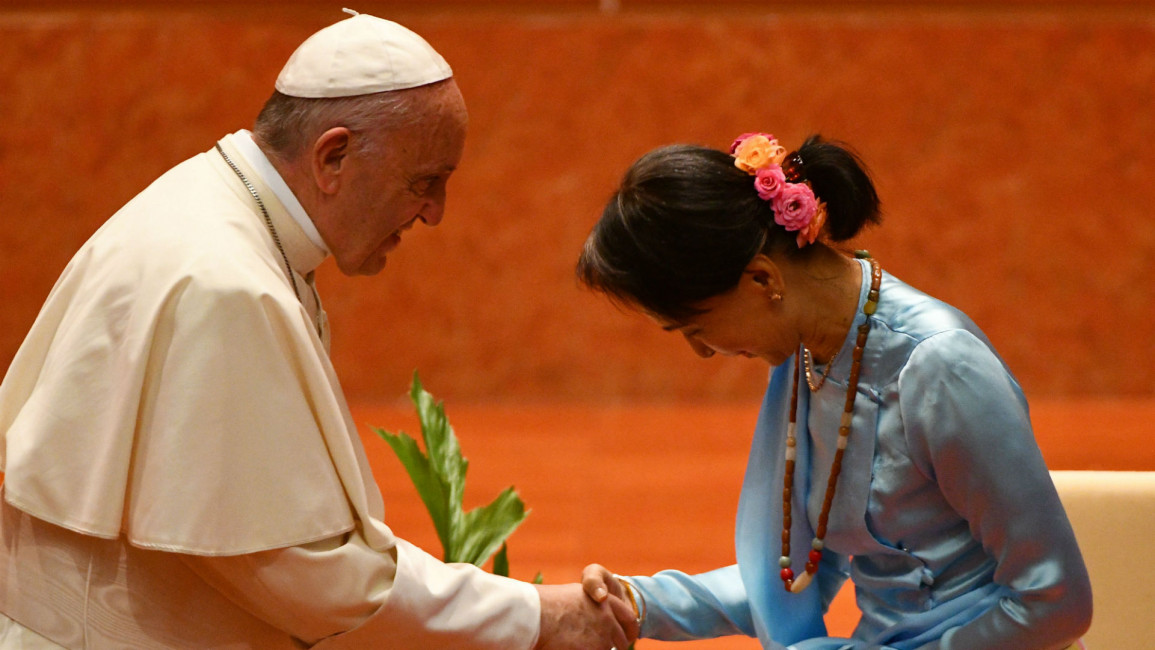Myanmar anger after Pope uses term 'Rohingya' in Bangladesh
Pope Francis' meeting with Rohingya refugees during his trip to Bangladesh has sparked anger in Myanmar after referring to them as "Rohingya".
Some 620,000 Rohingya live in squalid camps in Bangladesh having fled brutal Burmese government violence and oppression against the Muslim minority in Myanmar.
Days earlier during a visit to Myanmar, the Pope had defended his decision of avoid using the term Rohingya, saying he believed it was the best way to get his message across to both the civilian and military leadership without shutting down dialogue.
During his visit to the Buddhist-majority Myanmar, the Pope did not refer to the Rohingya by name or directly allude to the crisis in the Rakhine state, a term seen as incendiary to regime loyalists who deny the Muslim minority are an ethnic group.
Amnesty International has described the regime's military actions as a "deliberate campaign" against the Rohingyas' right to live in Myanmar.
Regime loyalists and many Buddhist Rakhine locals describe the Rohingya as "Bengalis" or illegal migrants from Bangladesh.
On Friday, when the head of the Catholic church met a group of the Rohingya refugees in the Bangladeshi capital Dhaka, he urged the world to take "decisive measures" to resolve the crisis that has forced hundreds of thousands from their homes and left a huge number of dead.
The comments marked his first explicit reference to the persecuted Muslim minority since the start of his diplomatically fraught tour, and outrage on Myanmar's social media ensued.
Myanmar, a country locked off from modern communications for five decades but which now has an active social media, reacted in anger to the Pope's comments.
"He is like a lizard whose colour has changed because of weather," said Facebook user Aung Soe Lin.
"He should be a salesman or broker for using different words even though he is a religious leader," said another Facebook user called Soe Soe.
Last month, Human Rights Watch released a report documenting how Myanmar's security forces committed widespread rape against women and girls as part of a campaign of ethnic cleansing against Rohingya Muslims in the Rakhine State.
Myanmar's authorities have continued to deny the growing documentation. In September, the Rakhine state border security minister rejected the reports saying: "Where is the proof? Look at those women who are making these claims – would anyone want to rape them?"
Scenes of dispossessed Rohingya fleeing en-masse as their villages in Rakhine State burn behind them have provoked outrage around the world.
An internal investigation conducted by the Burmese military was released last week, clearing themselves over the reported Rohingya atrocities. The report, described as 'white-washing' by human rights groups prompted the US secretary of state to call for a "credible" investigation.
The Rohingya have faced discrimination for decades in Buddhist-majority Myanmar where they are denied citizenship and denigrated as illegal 'Bengali' immigrants.


![Widespread famine is imminent in Gaza [Getty Images]](/sites/default/files/styles/image_330x185/public/2024-03/GettyImages-2015647000.jpg?h=199d8c1f&itok=mJWWP_Td)
